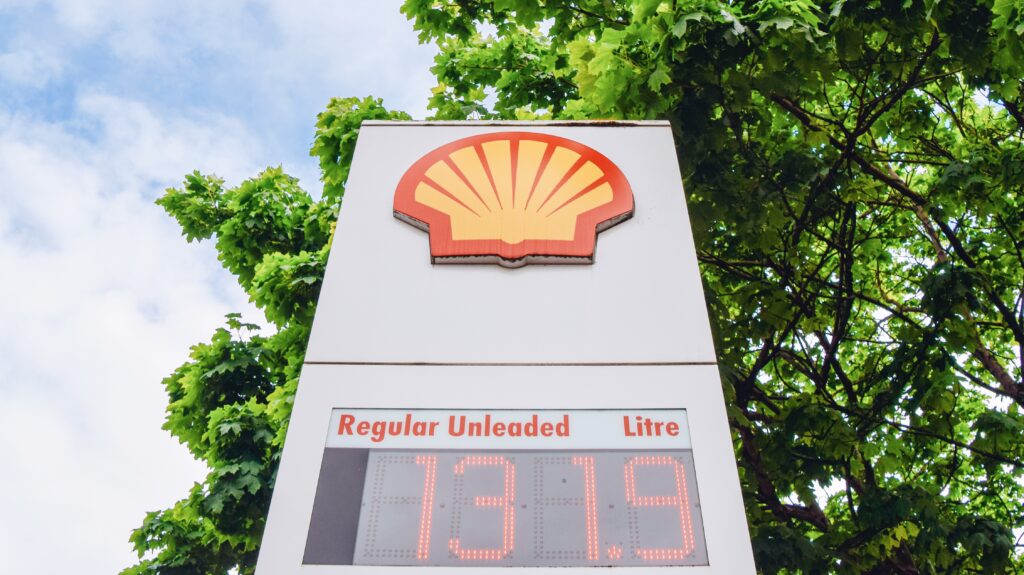Updated May 27, 2021. In a landmark case, a Dutch court has ruled that Shell is liable for its contributions to climate change and must reduce its CO2 emissions.
The “People versus Shell” lawsuit was first launched in 2019 by Friends of the Earth Netherlands, with the support of Greenpeace Netherlands, ActionAid, Both ENDS, Fossielvrij NL, Jongeren Milieu Actief, the Waddenvereniging, and 17,379 Dutch citizens.
This is the first time ever that such a major fossil fuel producer has been held legally accountable for its actions. The British-Dutch oil multinational was 5th in 2020’s Fortune Global 500 list with a revenue of $352 billion, and is one of the 10 most climate polluting companies in the world.

Shell Ordered to Cut CO2 Emissions
At the conclusion of the two-year case earlier on Wednesday, The Hague court ordered Shell to reduce its CO2 emissions by 45 percent ahead of 2030.
This target was suggested by climate groups to reflect the Paris Climate Agreement’s emissions targets. It is significantly lower than the company’s previous goals of 20 percent by 2030, 45 percent by 2035, and 100 percent by 2050.
“Shell claims it will stick to the Paris Agreement targets, but it emits two times the total greenhouse gas emissions of the Netherlands and continues to drill for more oil and gas,” said Sam Cossar, Program coordinator at Friends of the Earth International, in a statement sent to LIVEKINDLY. “Many people in the Netherlands and around the world want action on climate change.”
It is hoped that the new emissions targets will help limit climate change to 1.5 degrees — a still irreversible but less catastrophic level of global warming than 2 degrees.
“This verdict is a historic victory for the climate and everyone facing the consequences of the climate crisis,” said Andy Palmen, interim director of Greenpeace Netherlands, in a press release.
“[It’s] a clear signal to the fossil fuel industry. Coal, oil and gas need to stay in the ground,” he continued. “We can hold multinational corporations worldwide accountable for the climate crisis.”
How Bad is Shell for the Environment?
Back in December, Shell’s lawyers told the court that it was already taking “serious steps” to support a global move away from fossil fuels, but that dealing with the threat of climate change ultimately fell to the world’s governments.
“The court found that corporations have an independent responsibility for CO2 reduction, regardless of what states do. The ruling in this case also has implications for other oil and gas corporations,” said Cossar.
Over the years, critics have repeatedly accused Shell of attempting to shirk responsibility for its negative impact on the environment through greenwashing, misinformation, and the stark contrast between its sustainability targets and the disappointing lack of progress.
In November, Shell asked its Twitter followers what they were willing to change in their own lives to help reduce harmful emissions. More than 6,000 people replied, including U.S. Congresswoman Alexandria Ocasio-Cortez and teenage climate activist Greta Thunberg, pointing out the hypocrisy of the oil industry placing this responsibility on individuals.
Just a few months earlier, an Unearthed (Greenpeace’s journalism platform) and Huffington Post investigation revealed that Shell remains an active member of multiple trade organizations lobbying against climate measures in the U.S. and Australia.
Throughout 2020, Shell produced 63 million tons of greenhouse gas emissions. And as recently as this January, courts ordered the company to compensate Nigerian farmers for damages caused by oil spills in 2004 and 2005, following a contracted 13 year legal battle.
‘People around the world are demanding climate justice’
Also on Wednesday, activist investor Engine No. 1. managed to oust at least two ExxonMobil directors from the oil and gas company’s board. The pro-climate firm has heavily criticized Exxon’s reluctance to move away from fossil fuels in favor of renewable energy.
Last night, Chevron investors voted in favor of a proposal to cut emissions generated by the energy company’s products. Commentators suggest that the overwhelming support for emissions reductions represents growing investor frustration with high-impact companies such as Chevron, Exon, and Shell, as shown by the conclusion of today’s case.
“People around the world are demanding climate justice,” said Palmen. “Shell cannot continue to violate human rights and put profit over people and the planet.”


